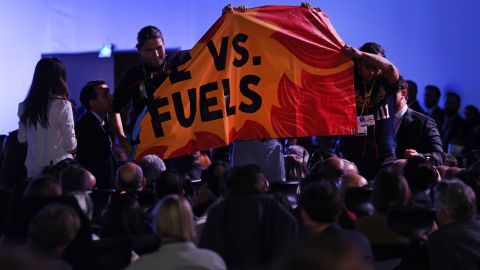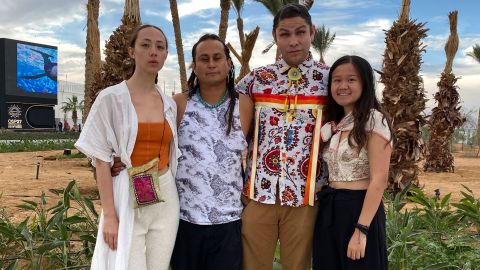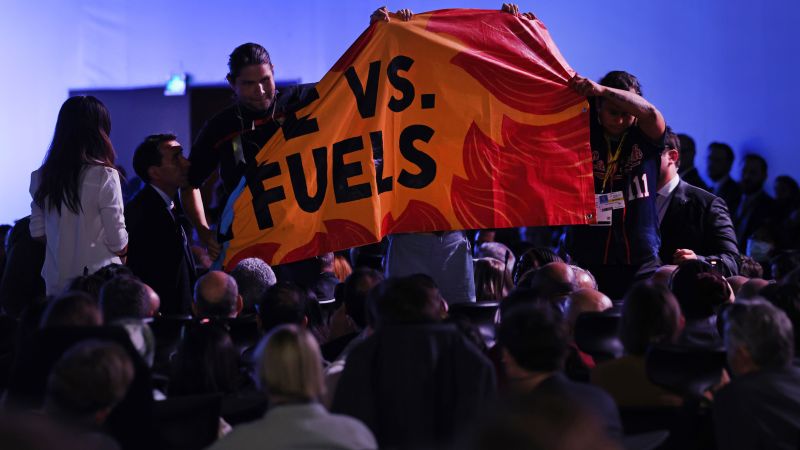These climate activists protested during Biden’s speech and got kicked out of the COP27 summit | CNN
CNN
—
Four American climate activists have been kicked out of the COP27 UN climate talks in Egypt after protesting during US President Joe Biden’s speech on Friday.
The group briefly interrupted Biden’s speech with what they described as an indigenous war cry, then unfurled a banner which read “People vs Fossil Fuels.” While Biden appeared mostly unfazed by the protest – pausing for a short moment before resuming his address – the four activists faced consequences.
They told CNN they were barred by security from leaving the room after the speech ended, their summit passes were then taken away, and they were escorted out of the venue by UN security.
“The security said that we put people’s lives at risk because we stood up abruptly in the room with the President of the United States,” Jamie Wefald, one of the protesters, told CNN on Monday. “And I said I understand, but just to be clear, you guys knew we had no weapons because we have to go through a very extensive security to get into COP in general, and they said, ‘Well, no security is 100%.’ “
It is unclear whether the group broke any rules by staging the protest, which was mostly silent and did not involve the protesters moving away from their seats. The UNFCCC, the UN body that is sponsoring the talks and is responsible for security in the venue, did not respond to CNN’s request for comment.
CNN witnessed three of the activists being denied entry to the venue on Monday afternoon, with UN staff telling them they have been suspended. CNN has asked the White House for comment, but has not heard back.
The episode is just the latest example of the somewhat heavy-handed approach to protests the UN and the Egyptian government adopted at the conference held in the Red Sea resort town of Sharm el-Sheikh.


The annual conference has always been seen as the place where activists and members from civil society groups get to interact with government officials and observe negotiations firsthand.
Huge protests and loud calls for action have become part of the event over the years. When climate activists marched through the streets of Glasgow during the COP26 conference last November, it was one of the biggest protests the UK has ever seen. At COP25 in Madrid in 2019, tens of thousands of protesters filled the city center, just as they had the year before in the Polish city of Katowice, the host of COP24.
But at this year’s iteration of the summit, protesters have mostly been sidelined into spaces far away from the negotiations.
The biggest protest of the summit so was held inside the conference on Saturday, when a large group of people marched through the venue, demanding rich countries to pay the world’s most vulnerable countries for loss and damage caused by the climate crisis.
But most other protests have been so small they are almost hard to spot by anyone who doesn’t know they are happening.
A small group of activists has been staging protests around the venue in the past few days, holding up banners calling for plant-based diets as a solution to the climate crisis. On Monday, a group of young protesters from the Fridays for Future took photos at the conference, calling on G20 leaders to act on climate.
“It hurts to say this, but they don’t get attention. There’s so many actions that happen within the COP space that are meaningful – people whose communities, our communities, are affected are speaking about it, and they offer solutions to these problems but there’s no coverage at all,” said Big Wind, climate activist and a member of the Northern Arapaho Tribe.
Protests are rare – and mostly illegal – in Egypt and the Egyptian government said anyone wishing to protest during the summit can only do so in a special dedicated “protest zone” away from the main conference site.
To access the zone, people need to register, a requirement which may scare off activists fearing surveillance. Among the rules imposed by the Egyptian authorities on the protests is a ban on the use of “impersonated objects, such as satirical drawings of Heads of States, negotiators, individuals.”
“All the meetings that we had, I can only speak for myself, but they were really trying to instill fear in us, you know, it’s such a repressive state … but inside the [conference venue], that is supposed to be UN territory,” said Jacob Johns, another of the group of activists who had been suspended from the conference. “And so for the UN to be denying people free speech in that space that is supposed to be theirs is just, you know, a slap in the face. It’s hypocrisy.”
For all the latest world News Click Here

